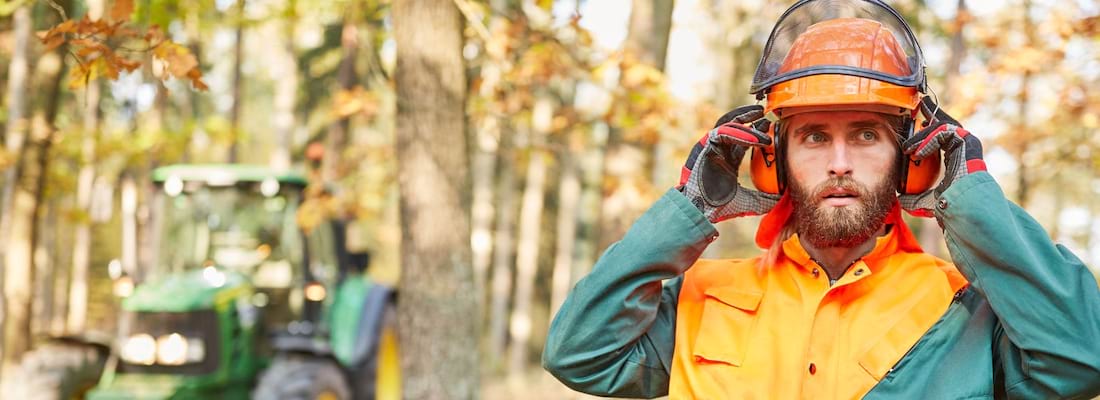Hearing loss is a common problem in Ireland, with 1 in 6 people suffering from some degree of hearing loss. Hearing loss can be hereditary or as a result of an accident, but repeated exposure to high levels of noises can also cause irreversible hearing loss. This makes jobs where workers are exposed to loud noises, such as farmers and agricultural workers, particularly vulnerable to hearing loss. In this blog, we are going to take a closer look at hearing loss among farmers and agricultural workers, while also looking at the steps they can take to protect their hearing.
Hearing loss among Farmers and agricultural workers can not only have a negative impact on the farm work, but also their quality of life, personal relationships, ability to communicate with others, mental health and even personal safety. Recent research also suggests that hearing loss is associated with an increased risk of dementia and social isolation.
Why should farmers and agricultural workers be concerned about hearing loss?
- - Hearing loss from exposure to high levels of noise is common among farmers and agricultural workers.
- - Hearing loss from noise is permanent and irreversible.
- - Hearing loss causes loss of life quality for farmers and farm families.
- - For most farmers, hearing loss occurs gradually over many years and may only be noticed until it is a serious problem.
- - Hearing loss from noise can be prevented.
What are the sources of hazardous noise in agriculture?
Hazardous levels of noise are produced by many kinds of agricultural equipment. Among others, they include:
- - Tractors
- - Combine Harvesters
- - Livestock
- - Chainsaws
- - Firearms
- - Grain Dryers
- - Trucks
- - Welders
- - Air compressors
- - Shop vacuums
- - Irrigation pumps
What is too loud?
Decibels (dB) is the unit of measurement used for sound. Sounds that are at or below 70dB are generally considered safe, while sounds at or above 85dB are likely to damage a person's hearing over time with repeated exposure.
To give you a better idea of what that means on a farm, an enclosed tractor cab exposes you to about 92dB of sound, squealing pigs expose can reach levels of roughly 100dB, while a working chainsaw exposes you to about 115dB. As a general rule, any noise levels that leaves you with a ringing in the ears or a temporary reduction in your hearing is too loud! If you are in a noisy location, and you have to raise your voice above a normal speaking voice just to be heard, then the noise is considered to be too loud.
How can farmers protect their hearing?
Exposure to noise can be controlled in many ways. The following are common methods for agricultural workers:
- - Protection – The first step to protect your hearing is to wear adequate earmuffs or expandable ear plugs and always have them easily accessible.
- - Reduce sound levels - When selecting new equipment, ask about sound levels and pick the quietest option.
- - Isolate yourself from noise - Working in motorised equipment equipped with cabs or enclosures will reduce noise exposure. Open tractors, loaders, and ATV exposes operators to more noise than similar equipment with enclosed cabs.
- - Perform routine equipment maintenance. For example, fixing mufflers on engines, lubricating bearings, and replacing worn parts will reduce noise levels and improve farming operations.
- - Minimize the amount of time you spend in noisy settings as much as possible.
Get your hearing checked
Audiology Medical Services – Ireland’s leading independent audiology specialists – recommend that after the age of 45, you should have a hearing test every three years. We offer free adult hearing screening tests at all their clinics nationwide. If you are concerned about yourself or a loved one’s hearing, we are here to help you through this challenging process and help limit the impact it makes on your life. To make an appointment to talk to one of Audiology Medical Services’ clinically trained professional audiologists, available at clinics nationwide, freephone 1800 501 501 or visit www.audiologymedicalservices.ie
Hearing loss is a common problem in Ireland, with 1 in 6 people suffering from some degree of hearing loss. Hearing loss can be hereditary or as a result of an accident, but repeated exposure to high levels of noises can also cause irreversible hearing loss. This makes jobs where workers are exposed to loud noises, such as farmers and agricultural workers, particularly vulnerable to hearing loss. In this blog, we are going to take a closer look at hearing loss among farmers and agricultural workers, while also looking at the steps they can take to protect their hearing.
Hearing loss among Farmers and agricultural workers can not only have a negative impact on the farm work, but also their quality of life, personal relationships, ability to communicate with others, mental health and even personal safety. Recent research also suggests that hearing loss is associated with an increased risk of dementia and social isolation.
Why should farmers and agricultural workers be concerned about hearing loss?
- Hearing loss from exposure to high levels of noise is common among farmers and agricultural workers.
- Hearing loss from noise is permanent and irreversible.
- Hearing loss causes loss of life quality for farmers and farm families.
- For most farmers, hearing loss occurs gradually over many years and may only be noticed until it is a serious problem.
- Hearing loss from noise can be prevented.
What are the sources of hazardous noise in agriculture?
Hazardous levels of noise are produced by many kinds of agricultural equipment. Among others, they include:
- Tractors
- Combine Harvesters
- Livestock
- Chainsaws
- Firearms
- Grain Dryers
- Trucks
- Welders
- Air compressors
- Shop vacuums
- Irrigation pumps
What is too loud?
Decibels (dB) is the unit of measurement used for sound. Sounds that are at or below 70dB are generally considered safe, while sounds at or above 85dB are likely to damage a person's hearing over time with repeated exposure.
To give you a better idea of what that means on a farm, an enclosed tractor cab exposes you to about 92dB of sound, squealing pigs expose can reach levels of roughly 100dB, while a working chainsaw exposes you to about 115dB. As a general rule, any noise levels that leaves you with a ringing in the ears or a temporary reduction in your hearing is too loud! If you are in a noisy location, and you have to raise your voice above a normal speaking voice just to be heard, then the noise is considered to be too loud.
How can farmers protect their hearing?
Exposure to noise can be controlled in many ways. The following are common methods for agricultural workers:
- Protection – The first step to protect your hearing is to wear adequate earmuffs or expandable ear plugs and always have them easily accessible.
- Reduce sound levels - When selecting new equipment, ask about sound levels and pick the quietest option.
- Isolate yourself from noise - Working in motorised equipment equipped with cabs or enclosures will reduce noise exposure. Open tractors, loaders, and ATV exposes operators to more noise than similar equipment with enclosed cabs.
- Perform routine equipment maintenance. For example, fixing mufflers on engines, lubricating bearings, and replacing worn parts will reduce noise levels and improve farming operations.
- Minimize the amount of time you spend in noisy settings as much as possible.
Get your hearing checked
Audiology Medical Services – Ireland’s leading independent audiology specialists – recommend that after the age of 45, you should have a hearing test every three years. We offer free adult hearing screening tests at all their clinics nationwide. If you are concerned about yourself or a loved one’s hearing, we are here to help you through this challenging process and help limit the impact it makes on your life. To make an appointment to talk to one of Audiology Medical Services’ clinically trained professional audiologists, available at clinics nationwide, freephone 1800 501 501 or visit www.audiologymedicalservices.ie









0 Comments
Add Comment